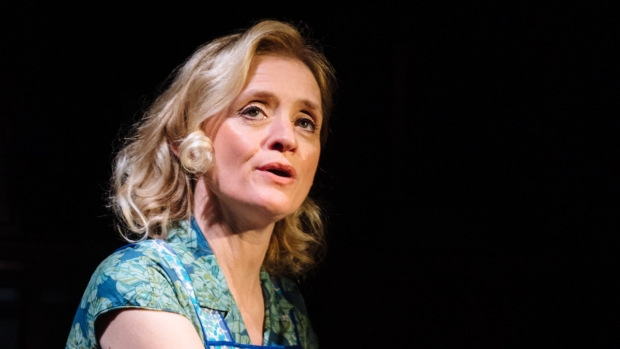The House of Shades at the Almeida – review

© Helen Murray
There are plays that are small, neat and perfect. And then there are plays like Beth Steel's The House of Shades which arrive on stage big, baggy and bold – a great sprawling saga of a thing, spanning the life of one family and the politics of England from 1965 to 2019.
There is hardly an issue unturned from the collapse of the trade union movement to the rise of zero-hours contracts; from women's employment rights to the death of manufacturing. There's abuse, abortion, Thatcher, Blair and Brexit.
Underpinning it all is the dead hand of the past on the present, the difficulty of shaping meaningful change at both an individual and societal level – and, as in Greek tragedy, the way that ghosts haunt families down generations. It's a lot, arguably too much but as performed by a cast led by a sensational Anne-Marie Duff, I could never quite tear my eyes away.
Steel sets her action amongst the Websters, a working-class family living in Nottinghamshire. The mother Constance (Duff) is a shimmering, simmering figure, tied to the kitchen sink but prone to quoting Bette Davis and dreaming of another life as a singer. The father, Alistair, (a wonderful Stuart McQuarrie) is a trade union official, whose hero is Nye Bevan but who spends his days in meetings, fighting for better conditions for the working man (and it definitely is a man), inspired by the ideal of the great post-war settlement of progress and a sharing society. They live with three children and Constance's mourning mother in a crowded, noisy house, full of incident.
Anna Fleischle's cluttered set is, like the play itself, both real and surreal. The kitchen table is a place where bodies are laid out (tended to by a choric neighbour in the shape of Beatie Edney) and a battleground for the soul of politics where Alistair's socialist idealism is tested both by his son Jack's drift from Communism to conservatism, and by his wife's sense that contentment is a dirty word.
There are too many great gobbets of political theory (and a visit from Bevan to Alistair on his allotment is a fantasy too far). But at moments, when the political truly becomes the personal, when Jack (Michael Grady-Hall) and his sister Agnes (Kelly Gough) fight like children over the destruction of community and caring that his beliefs have wrought, the play takes flight.
Steel's analysis of the powerlessness that the working class have felt as manufacturing jobs vanished from towns that once thrived, and the way their frustration at being left behind became one of the causes of Brexit, is both acute and expressed in language that is wonderfully vivid and earthy. "She's pissed all over your strawberries then?" says Agnes, gloating over the way Jack's Thatcherite wife has left him – and in lines like that you hear the authentic tang of language being manipulated by a writer who glories in its sound. Gough's dynamic, impassioned portrayal gives the words their full weight.
Around all the talk, a family drama bubbles and broils. Director Blanche McIntyre beautifully modulates its movement, carefully holding the lurches in tone from gritty to fantastic, emphasising the sense in which this family is constantly haunted by its choices. There's a wonderful scene when Alistair's body, sits up out of his body bag, and talks to the estranged Jack; a dead daughter, Laura (Emma Shipp, making her stage debut) literally shakes the action.
At the heart of it all is Duff, incandescently powerful. Her character is viciously disappointed by life, yet Duff's great gift is to show where that anger comes from. Her face is a constant image of her feelings, filling with light when she listens to a romantic song, clouded by fury when she recounts how everything could have been different if only she had been allowed to go to grammar school.
The pure venom with which she endows the line: "Nobody's going anywhere – there's cake" after a particularly disruptive family row is worthy of her character's heroine Davis. But the sadness and melancholy she brings to this portrayal of a woman whose life is blighted by circumstance and character is something else. It is a truly great performance in an unruly yet riveting play that reveals Steel as an outstanding talent.












